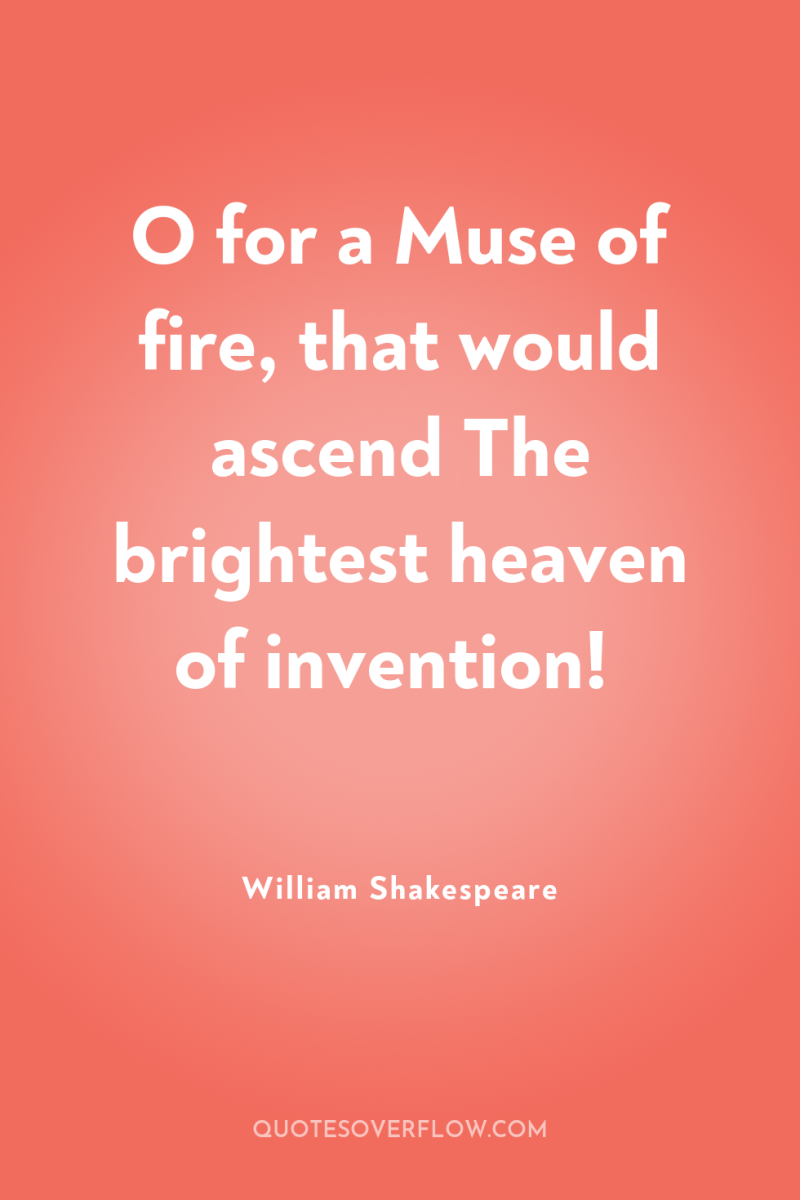1
Every subject's duty is the King's; but every subject's soul is his own. Therefore, should every soldier in the wars do as every sick man in his bed, wash every mote out of his conscience; and dying so, death is to him advantage; or not dying, the time was blessedly lost wherein such preparation was gained; and in him that escapes, it were no sin to think that, making God so free an offer, He let him outlive the day to see His greatness and to teach others how they should prepare.William Shakespeare

2
O for a Muse of fire, that would ascend The brightest heaven of invention!William Shakespeare
![[Thine] face is not worth sunburning.](https://cdn.quotesoverflow.com/file/quotesoverflow/images/thine-face-is-not-worth-sunburning-342448517621-1200.webp)
3
[Thine] face is not worth sunburning.William Shakespeare
4
Once more unto the breach, dear friends, once more; Or close the wall up with our English dead! In peace there's nothing so becomes a man As modest stillness and humility: But when the blast of war blows in our ears, Then imitate the action of the tiger.William Shakespeare

5
I am afeard there are few die well that die in battle, for how can they charitably dispose of anything when blood is their argument?William Shakespeare
6
In peace there's nothing so becomes a man as modest stillness and humility; but when the blast of war blows in our ears, then imitate the action of the tiger; stiffen the sinews, summon up the blood, disguise fair nature with hard-favor'd rage.William Shakespeare
7
He which hath no stomach to this fight, let him depart, his passport shall be made and crowns for convoy put into his purse. We would not die in that man's company that fears his fellowship, to die with us.William Shakespeare
8
What infinite heart's-ease Must kings neglect, that private men enjoy! And what have kings, that privates have not too, Save ceremony, save general ceremony? And what art thou, thou idle ceremony? What kind of god art thou, that suffer'st more Of mortal griefs than do thy worshippers? What are thy rents? what are thy comings in? O ceremony, show me but thy worth! What is thy soul of adoration? Art thou aught else but place, degree and form, Creating awe and fear in other men? Wherein thou art less happy being fear'd Than they in fearing. What drink'st thou oft, instead of homage sweet, But poison'd flattery? O, be sick, great greatness, And bid thy ceremony give thee cure! Think'st thou the fiery fever will go out With titles blown from adulation? Will it give place to flexure and low bending? Canst thou, when thou command'st the beggar's knee, Command the health of it? No, thou proud dream, That play'st so subtly with a king's repose; I am a king that find thee, and I know' Tis not the balm, the sceptre and the ball, The sword, the mace, the crown imperial, The intertissued robe of gold and pearl, The farced title running 'fore the king, The throne he sits on, nor the tide of pomp That beats upon the high shore of this world, No, not all these, thrice-gorgeous ceremony, Not all these, laid in bed majestical, Can sleep so soundly as the wretched slave, Who with a body fill'd and vacant mind Gets him to rest, cramm'd with distressful bread; Never sees horrid night, the child of hell, But, like a lackey, from the rise to set Sweats in the eye of Phoebus and all night Sleeps in Elysium; next day after dawn, Doth rise and help Hyperion to his horse, And follows so the ever-running year, With profitable labour, to his grave: And, but for ceremony, such a wretch, Winding up days with toil and nights with sleep, Had the fore-hand and vantage of a king. The slave, a member of the country's peace, Enjoys it; but in gross brain little wots What watch the king keeps to maintain the peace, Whose hours the peasant best advantages.William Shakespeare
9
Men of few words are the best men."(3.2.41)William Shakespeare
10
O for a Muse of fire, that would ascend The brightest heaven of invention, A kingdom for a stage, princes to act And monarchs to behold the swelling scene! Then should the warlike Harry, like himself, Assume the port of Mars; and at his heels, Leash'd in like hounds, should famine, sword and fire Crouch for employment. But pardon, and gentles all, The flat unraised spirits that have dared On this unworthy scaffold to bring forth So great an object: can this cockpit hold The vasty fields of France? or may we cram Within this wooden O the very casques That did affright the air at Agincourt?O, pardon! since a crooked figure may Attest in little place a million; And let us, ciphers to this great accompt, On your imaginary forces work. Suppose within the girdle of these walls Are now confined two mighty monarchies, Whose high upreared and abutting fronts The perilous narrow ocean parts asunder: Piece out our imperfections with your thoughts; Into a thousand parts divide on man, And make imaginary puissance; Think when we talk of horses, that you see them Printing their proud hoofs i' the receiving earth; For 'tis your thoughts that now must deck our kings, Carry them here and there; jumping o'er times, Turning the accomplishment of many years Into an hour-glass: for the which supply, Admit me Chorus to this history; Who prologue-like your humble patience pray, Gently to hear, kindly to judge, our play.William Shakespeare
11
He is as full of valor as of kindness. Princely in both.William Shakespeare
12
All things are ready, if our mind be so.William Shakespeare
13
But if the cause be not good, the king himself hath a heavy reckoning to make, when all those legs and arms and heads, chopped off in battle, shall join together at the latter day and cry all 'We died at such a place;' some swearing, some crying for a surgeon, some upon their wives left poor behind them, some upon the debts they owe, some upon their children rawly left. I am afeard there are few die well that die in a battle; for how can they charitably dispose of anything, when blood is their argument? Now, if these men do not die well, it will be a black matter for the king that led them to it; whom to disobey were against all proportion of subjection.[ Henry V, Act IV Scene I] .William Shakespeare
14
His jest shall savour but a shallow wit, when thousands more weep than did laugh it.William Shakespeare
15
But if it be a sin to covet honour, I am the most offending soul alive.William Shakespeare
16
So many horrid Ghosts.William Shakespeare
17
From this day to the ending of the world, But we in it shall be remembered- We few, we happy few, we band of brothers; For he to-day that sheds his blood with me Shall be my brother; be he ne’er so vile, This day shall gentle his condition; And gentlemen in England now-a-bed Shall think themselves accurs’d they were not here, And hold their manhoods cheap whiles any speaks That fought with us upon Saint Crispin’s day.William Shakespeare
18
But Kate, dost thou understand thus much English? Canst thou love me?" Catherine: "I cannot tell." Henry: "Can any of your neighbours tell, Kate? I'll ask them.William Shakespeare
19
Nice customs curtsy to great kings.William Shakespeare